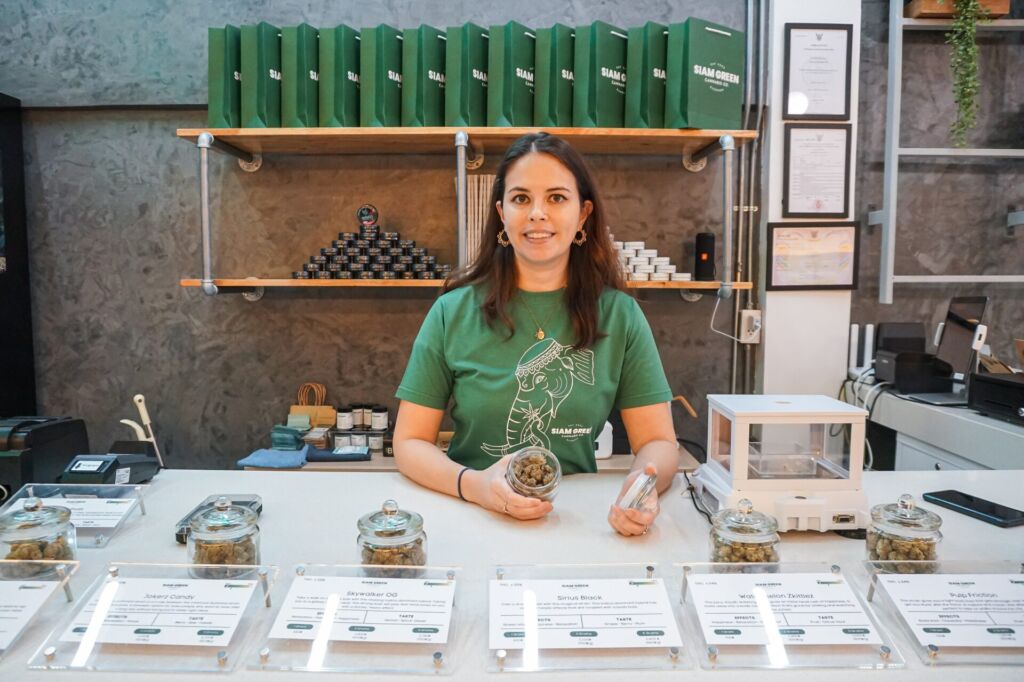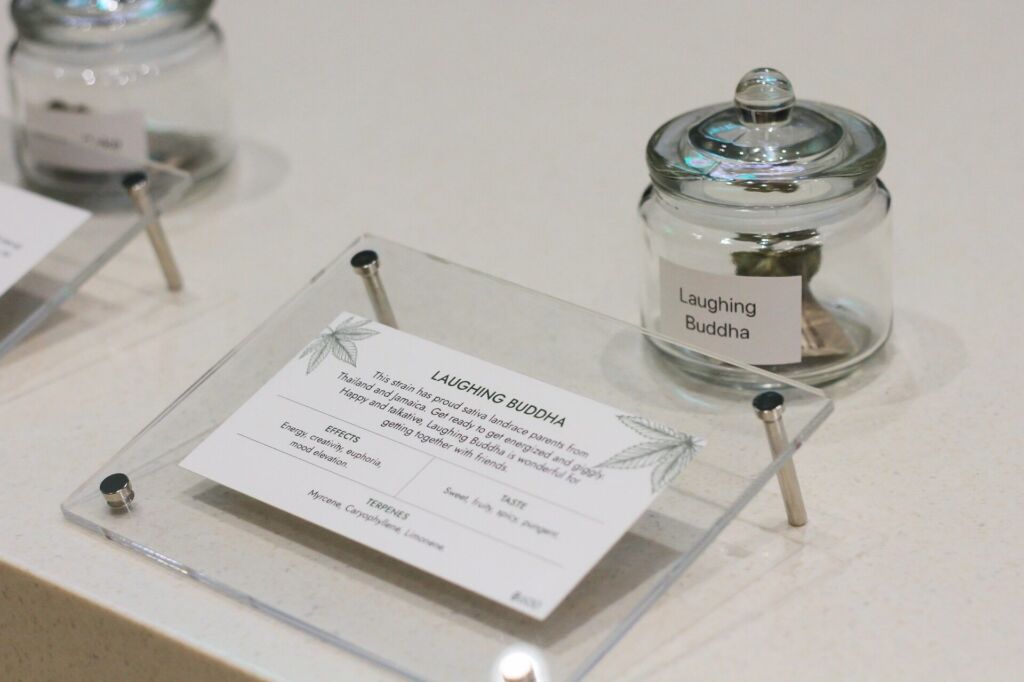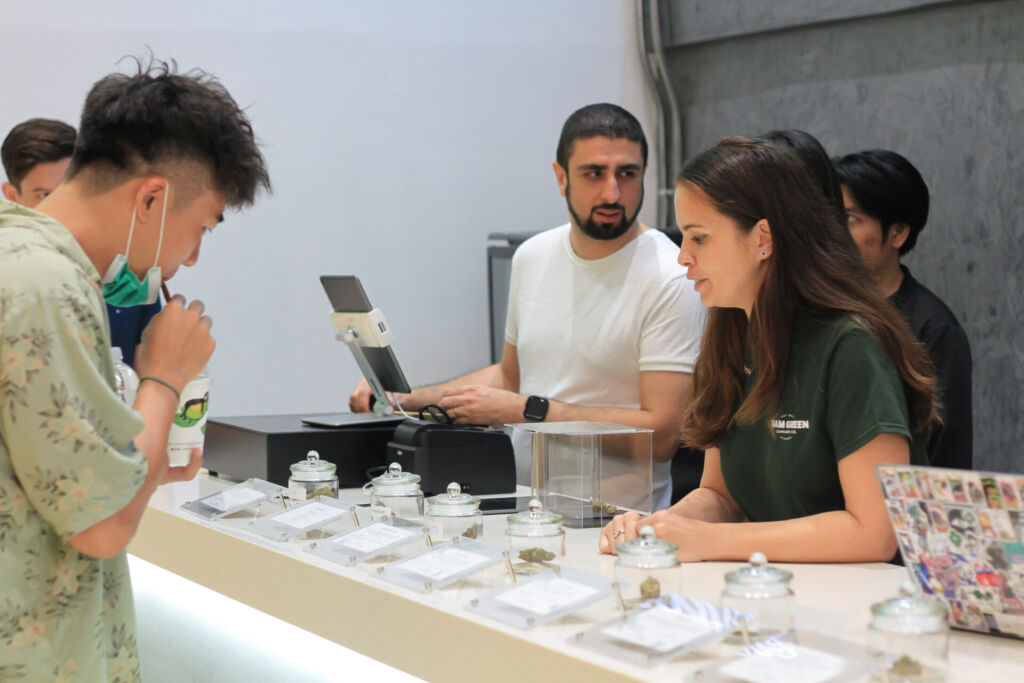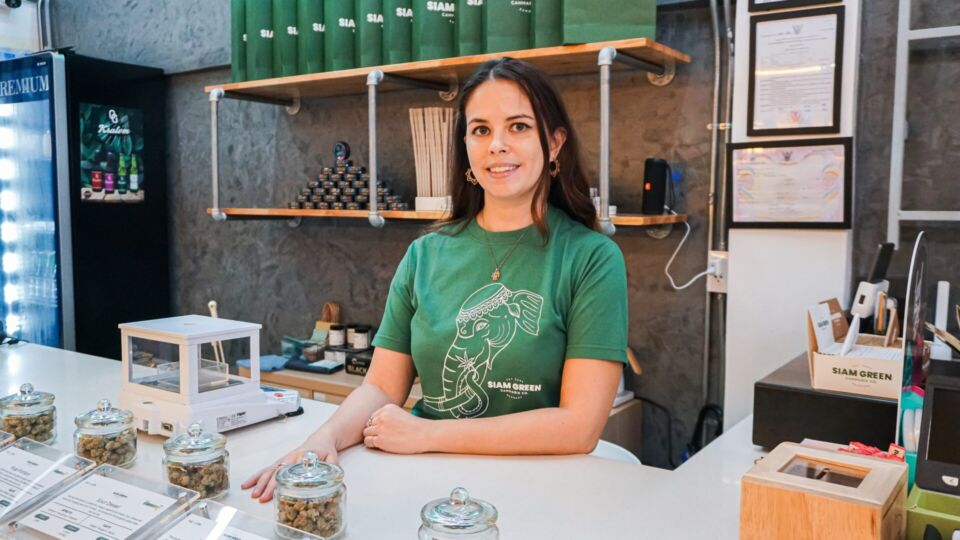Though Thailand’s mainstream cannabis culture is not yet a year old and many issues remain unsettled, it has been steering its course out of years of darkness.
Opened just this year inside a multi-story shophouse on Sukhumvit Road, Siam Green Cannabis dispensary is managed by Tian Scherer, a Thai-American veteran of California cannabis whose higher learning in nutrition and food science helps her connect customers to their ideal buds.
“My background was nutritional science, so I learned about organic chemistry, biology, and human anatomy so I am able to use that to help my patients better understand how cannabis works with their body,” said Tian, who studied nutrition at California State University, Northridge, in Southern California.
The 37-year-old dispensary manager entered the weed industry back in California’s medical marijuana days. Enthusiastic about both cannabis and nutrition, she worked as a budtender at places like Buds & Roses, an award-winning Los Angeles dispensary. Just last year, Tian wrote a book on eating the non-psychoactive compounds of cannabis for good health.
As Bangkok goes to pot, a new career blossoms: the budtender
And three years ago, she moved back to Thailand, saying she was “ready to try the next step.”
“When I moved back, I thought CBD was gonna be big. I was like ‘I could work with that,’” Tian said, referring to the compound in weed that doesn’t get people high but may hold benefits for pain, depression, and anxiety.
“But then all of a sudden on June 9, bam! Weed was legalized. That took me by surprise. I was able to pivot,” Tian said, laughing.
We sat down to talk with Tian about how she has paired her interests in nutrition and cannabis, what makes for an exceptional budtender, and where she sees the Thai cannabis scene headed. The interview was slightly edited for brevity and clarity.
When did you try weed for the first time?
I first tried weed in Nepal. I was going through a teenage rebellious phase so I told my parents I was going to the beach with friends, instead I went to the mountain kingdom for adventure. I met up with a friend and went with him on his art class field trip to the ancient city of Bhaktapur. There, we smoked hash and wandered around the city making charcoal sketches of the architecture.

You worked in the California industry for years. Memorable moments?
Budtending at Hollywood mansion parties, including Drake’s pool party, were highlights. But my most memorable experience is when I helped an elderly couple from Japan with the wife’s breast cancer in LA during the medical marijuana days. It took months of self-titrating and calculating out the perfect dose of THC and CBD for her that would be effective against the cancer but not get her uncomfortably high. They eventually had to go back home and cease treatment but it was a challenging but really rewarding experience being able to help someone like that.
Why did you switch from studying nutrition to slinging buds?
I was going to school for nutrition, and I needed a part-time job. I had friends who were in the cannabis industry and I love cannabis. I love helping people. So it seemed like a natural fit. I was working at Bud and Roses, which is famous for growing veganics (vegan and organic cannabis). They have no pesticides nor animal products used in the cultivation. Very clean medicine.
Then, I moved back to Thailand three years ago. I had lived in America for 16 and a half years. I missed Thailand. I think I was just ready for a new adventure.
So you love weed but you studied science. How was that helpful?
In organic chemistry I learned about self-titration, the process of gradually increasing the dose of an oil or tincture until you get the desired effect. Understanding the digestive system helped me explain the process of metabolizing edibles. I learned about disorders of the human body so I had a familiarity with my patients’ ailments.

Tian Scherer stands behind the counter inside the Siam Green Cannabis store on Sukhumvit Road. Photo: Chayanit Itthipongmaetee / Coconuts
Do you think that’s important for being a budtender? Should there be proper training?
Yes. I totally believe in that because there’s a lot of technicalities to know when it comes to cannabis. There is a science to it, you know? It’s a health science, honestly, so it’s good to have that background or be interested in learning that. It requires knowledge and interest in the science of it. We want nerds! (laugh)
What else makes for a good budtender?
Passion is important. You really have to be passionate because when you’re passionate about the medicine, the customers know, and then they trust you. It’s a very almost intimate relationship because you’re giving them something that’s psychoactive that’s gonna change their minds and bodies. So it really requires trust and intimacy.
Being a budtender also requires being very knowledgeable. Because you don’t wanna have that one customer who has underlying problems and then smoking makes it worse. You just wanna be careful. You wanna make sure that everyone is careful of side effects and everything.
Do you have any favorite strains?
Yes, Purple Thai. I personally love Thai strains. We also have a half-Thai strain, just like me (laugh). It’s called Laughing Buddha. It’s half Thai, half Jamaican. It’s a nice cup of coffee.
What should budtenders keep in mind?
They need to know that everyone is different. That the way that they perceive the strain is not gonna be the same way that someone else perceives the strain. And also ask for effects, what kinda effects do they want more for looking for desired outcomes as opposed to just, like, “indica, sativa, or hybrid?”
And it’s really up to the customers. I encourage the staff to ask them about their life. Like how often do you smoke? Do you like to work out? Are you active or do you like to sit on the couch? Or do you have any pain? Do you have insomnia? Because with that information then you can pick the best train for them.

Do you plan to make courses for your staff?
Yeah, I think I’m gonna start developing, especially when I start to get a little busier and I can’t like to sit down and teach them all the time. I might wanna do videos, like an online learning platform where I do videos. And then they can also take assessments like little quizzes online as well. And that way we can make sure that, you know, everyone is on the same page. It’s accessible to staff. That was something I was working on in the States. I’ve made it specifically for dispensaries because they had their own SOPs.
Biggest misconception about weed?
Yes: Indica, sativa, and hybrid – those labels are actually antiquated. It’s so common. I struggled because I was thinking I wanna teach them, I have to teach them this, but it’s so common.
So I taught, I taught them both. I taught them Instead of indica, sativa, or hybrid, ask customers instead what effects they want. I’ve been teaching my budtenders about terpenes. It’s still a relatively new concept. It was the first time or they had just heard of it when I began teaching about it.

What changes would make Thailand’s cannabis scene better?
It should not have so many obstacles to access. Like right now, edibles are illegal. I would love to see tinctures that are high in THC because a lot of different cancers respond better to THC than CBD. Like it is very medicinal. It would be fun to see hash, and different concentrates as well.
Do you think the United States is the ideal place, when it comes to cannabis laws?
No. I came from California and it was a disaster turning recreational. It was overtaxed, overregulated. It started being controlled by these big monopolies and that’s a thing I’d really hate to see here in Thailand. I want to be able to see these legacy farmers have a life and not see like these big McDonalds of marijuana come in and take over.
What do you hope for the future of Thai cannabis?
I would also love to see more Thai-grown. The market has been oversaturated with like Californian middle-grade stuff. That’s not why we legalized, you know? I would also really love to see more development of Thai landrace genetics. We have that pride. We should definitely develop genetics more on that.





